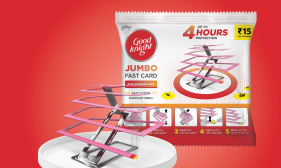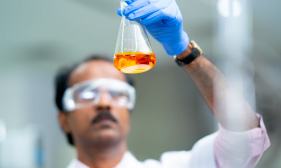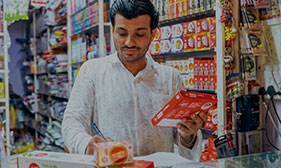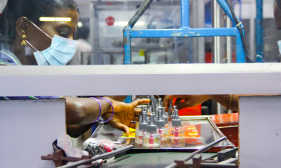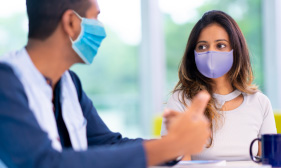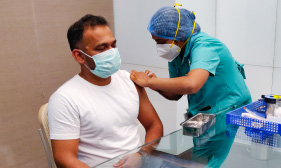Strategic Priority
Building an inclusive and greener world
Capitals Impacted
-

Intellectual
Capital -

Manufactured
Capital -

Human
Capital -

Natural
Capital -

Social and
Relationship
Capital
Risks
- Disruptions due to outbreaks of infectious diseases
- Regulatory compliance
- Social licence to operate
- Community unrest
Enablers
- Good & Green vision
- Godrej values
- Godrej purpose
- Godrej’s legacy of philanthropy
Key Focus Areas
- Establishing COVID-19 recovery initiatives to revive livelihoods and spread COVID-19 vaccination awareness
- Ensuring judicious use of natural resources
- Enhancing employability of beauty professionals
- Protecting people from vector-borne diseases
- Enabling sustainable communities
- Fostering volunteerism
Material Issues Impacted
- Building inclusive and prosperous communities
Value Created
We channelled one-third of our resources to support livelihood recovery from the pandemic for nano and micro entrepreneurs and communities working in the informal sector. We also took on the responsibility of vaccination awareness drives that helped reach out to low-income and underserved communities around our manufacturing locations, offices, and warehouses. This directly impacted our Social and Relationship Capital.
Meanwhile, we continued to remain committed to innovating and exploring new technologies and improving our processes to
become more sustainable through enhanced Manufactured Capital and Intellectual Capital.
We continued to focus on and invest in social programmes that align with our CSR and sustainability goals. We continued to leverage our Human Capital through volunteering efforts to maximise Natural Capital and Social and Relationship Capital.
United Nations’ Sustainable Development Goals
For more details, refer to the sustainable development goal mapping on our website







Godrej
Trusts
Approximately 23% of the promoter holding of the Godrej Group is held in trusts that invest in the environment, healthcare, and education.
Environment
We are proud to protect, develop, and maintain the largest privately managed belt of mangrove forests in Mumbai since the 1940s.
Education
The Godrej Udayachal pre-primary and primary schools focus on the all-round development of children. The Udayachal high school has been accredited with the International School Award in recognition of its global education curriculum and innovation in classroom teaching.
We also support Teach For India, a nationwide movement involving outstanding college graduates and young professionals who commit 2 years to full-time teaching in under-resourced schools and become lifelong leaders working towards the pursuit of equity in education. In the fiscal year 2021-22, the movement covered 250 under-resourced schools in India, with over 900 fellows impacting over 28,000 children. Teach For India has a strong network of over 6,200 alumni, serving over 33 million children. A recent study also revealed that the alumni community has founded over 150 organisations.
Healthcare
The Godrej Memorial Hospital aims to provide high-quality healthcare at affordable costs. One such initiative is our partnership with Smile Train, a USA-based NGO, which helps in performing corrective cleft lip and palate surgery in children from low-income families. We offer surgery and hospitalisation to these children free of cost.
The Godrej Udayachal school
focuses on the holistic
development of its students
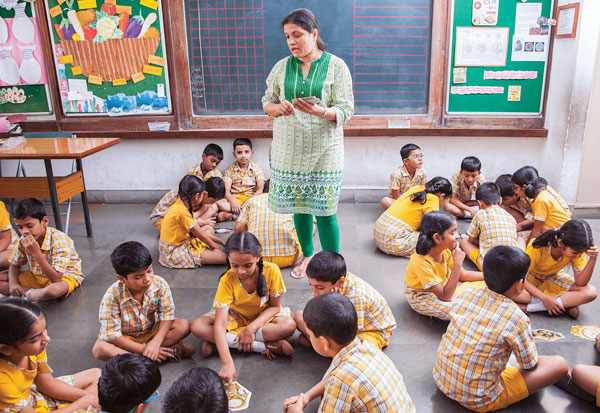
We own and care for mangrove
forests around our headquarters
Godrej One in Mumbai
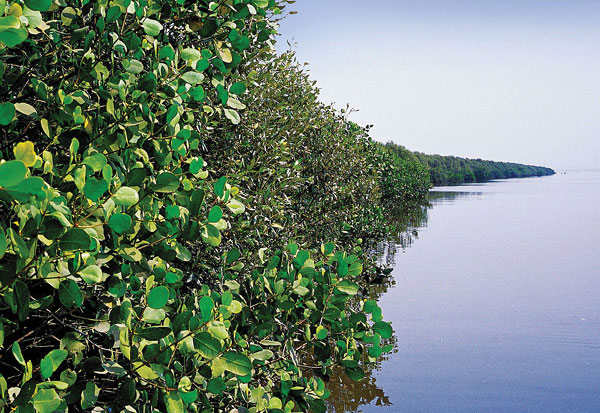
The Godrej Udayachal school
focuses on the holistic
development of its students

We own and care for mangrove
forests around our headquarters
Godrej One in Mumbai

Good
& Green
Sustainability at GCPL is guided by our Group’s Good & Green Vision 2025 that aims to create a more inclusive, equitable, and greener world. As a part of this, we will work with over 33 million people in the regions where we operate.
We have a comprehensive CSR Policy that outlines programmes and projects to create a positive impact on our stakeholders. Our CSR Committee reviews, monitors, and provides strategic inputs on our sustainability efforts.
We have aligned our initiatives with the United Nations’ Sustainable Development Goals, the Government of India’s social development priorities, and the needs of our local communities to deliver high-impact programmes.
In fiscal year 2021-22, we continued to support COVID-19 recovery programmes for livelihood revival and added vaccination awareness drives.
Our key focus areas and corresponding initiatives

COVID-19 recovery initiatives to revive livelihoods and COVID-19 vaccination awareness
- Ensuring food relief to the most vulnerable communities during the second wave in India
- Supporting livelihood recovery and revival programmes
- Raising vaccination awareness among the most vulnerable people in our ecosystem
- Enabling economic relief by enabling unlocking of government entitlements for underserved communities around our manufacturing plants, offices, and warehouses

Ensuring judicious use of natural resources
- Green projects to conserve energy, water, and materials and improve environmental sustainability at our manufacturing plants
- Sustainable supply chain initiatives
- Product sustainability through LCAs
- EPR compliance and exploring circular economy
- Innovation for sustainable packaging

Enhancing employability of beauty professionals
- Building resilience and providing support to micro and nano beauty entrepreneurs
- Enabling economic empowerment
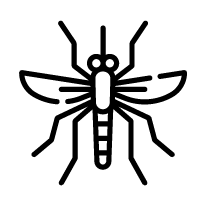
Protecting people from vector-borne diseases
- Through our Elimination of Mosquito Borne Endemic Diseases (EMBED) project, we support the Government’s initiatives to eradicate mosquito-borne diseases
- Strengthen public healthcare systems in 3 Indian states
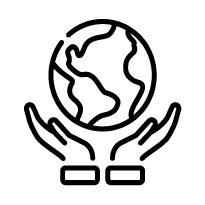
Enabling sustainable communities
- Implementing a range of environmental sustainability and community development initiatives

Fostering volunteerism
- Initiatives to get our team members to connect more meaningfully with our communities
I. COVID-19 recovery initiatives to revive livelihoods and COVID-19 vaccination awareness

The impact of COVID-19 has been felt as a public health crisis of unprecedented proportions.
It is also a long-term economic disaster impacting the lives and livelihoods of billions of people worldwide. Even when vaccinations began, people from low-income and underserved communities were left behind. In emerging markets where GCPL operates, this is further complicated by pre-existing inequalities.
Livelihood recovery and revival programmes
We provided need-based food relief kits to the most vulnerable in the geographies of key interest, such as around our manufacturing units, offices, and warehousing facilities. Furthermore, we provided support such as livelihood recovery training, access to returnable grants, training on business recovery, and handholding nano and micro entrepreneurs to ensure they were able to successfully emerge from the second and third COVID-19 waves in India.
Responding to the need of the most vulnerable communities such as informal sector workers, domestic help, and other such communities, we provided 6,365 food kits to people across Goa, Gujarat, Jammu & Kashmir, Karnataka, Kerala, Maharashtra, Rajasthan, Uttar Pradesh, Uttarakhand, and West Bengal. Moreover, we donated medical equipment (such as ventilators, oxygen concentrators, hospital beds, and intensive-care-unit monitors) and consumables worth ₹2.5 crore to 20 hospitals in key locations for GCPL pan-India. Finally, 4.94 lakh units of masks, sanitisers, and soaps were distributed during the second wave to frontline workers and the most vulnerable communities.
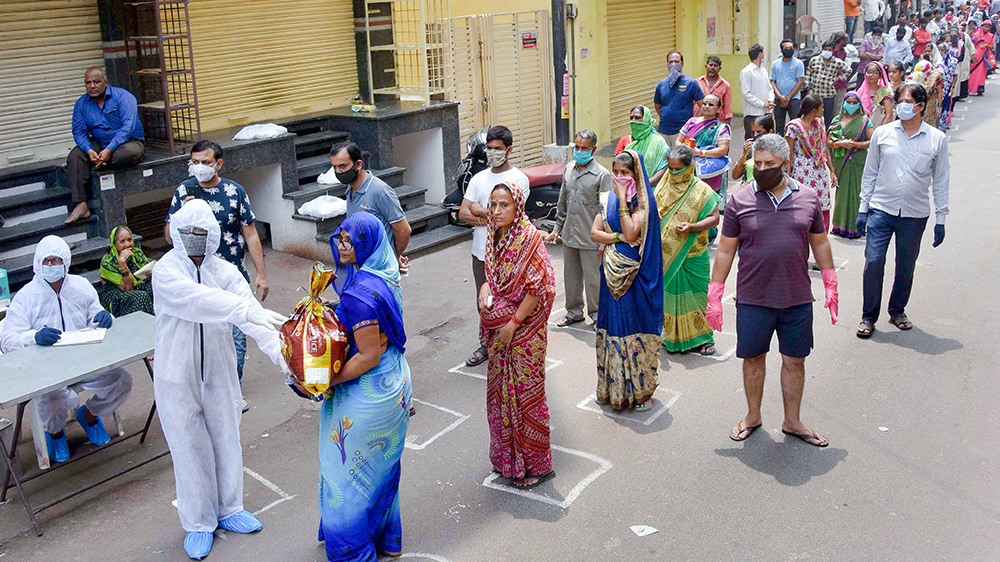
Donating food supplies among local
communities in India
In Kolkata and Guwahati, we provided livelihood recovery training and support to 7,166 street vendors—one of the most vulnerable and at-risk occupation groups within the informal sector workers. We trained them on health, hygiene, safe product handling, proper waste disposal, business and financial literacy, and digital payment methods. We also raised awareness on various social entitlements and social protection schemes available to them, and over 1,600 people applied for various schemes and entitlements.
In Thane and Palghar, we mobilised 90 entrepreneurs to establish micro enterprises in rural areas that will positively impact over 600 people and help them set up market platforms. The project has a special focus on women and returned migrant worker-led enterprises. We developed enterprises in farm produce value addition, aggregation, and trading. We are also creating marketplaces for rural entrepreneurs by setting up farmer markets. These pop-up marketplaces will help connect buyers (urban India) and sellers (from rural India), leading to responsible consumption and production. Close to 75% of the entrepreneurs are active, and we are enabling their access to finance and government schemes.
In Baddi, Jammu, Pune, and Lucknow, we helped provide formal sector jobs to 3,353 out-of-work adults and enabled 1,575 adolescents to stay in school. We placed 3,228 people in the formal sector with an average salary of ₹11,367. We engaged with adolescents and provided learning opportunities, enhancing their life skills, and building their resilience

We provided relief packages and hygiene essentials to people from vulnerable communities
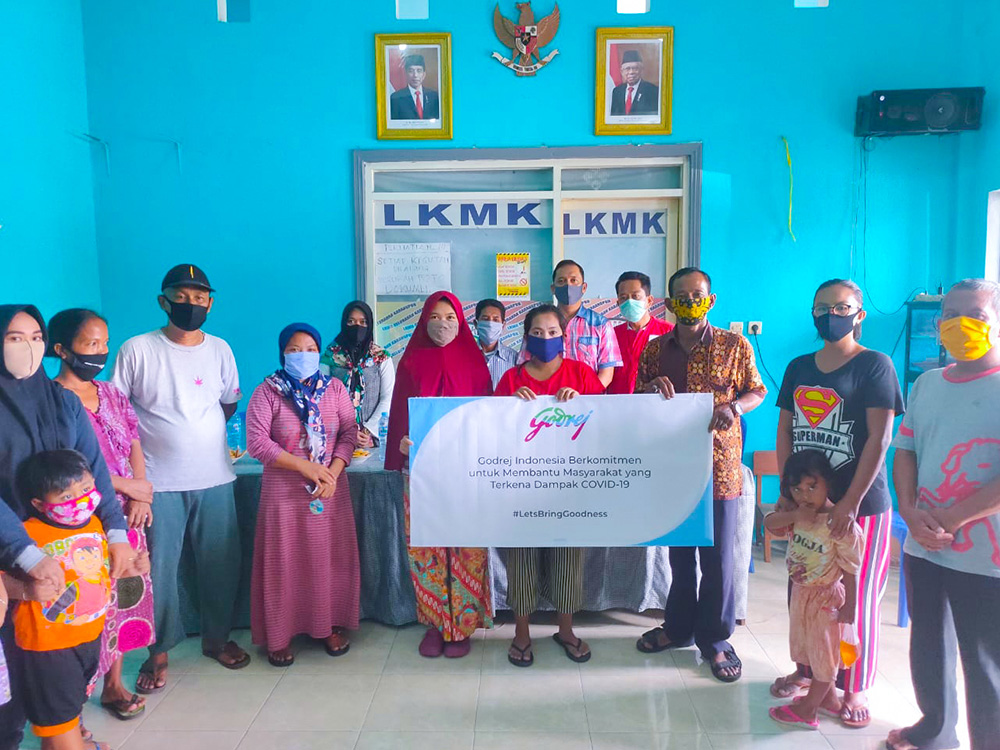
We donated critical medical
equipment to hospitals across India
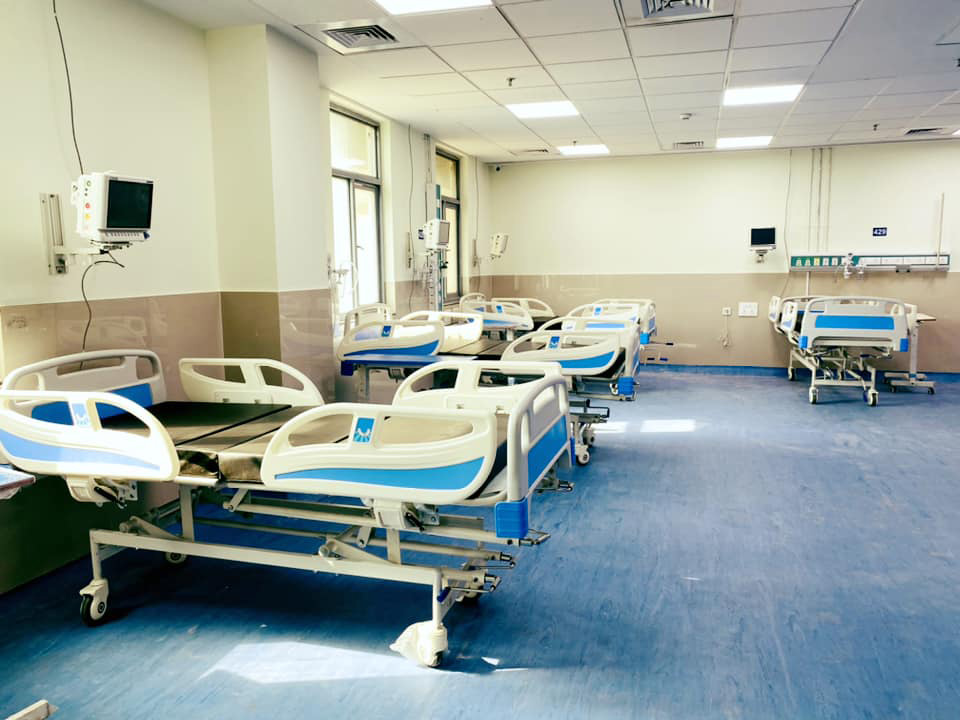
Enabling access to entitlements
National and state governments have announced various welfare schemes for those who have been hit the hardest by the pandemic, and we are working with our non-profit partners to unlock these funds.
In Mumbai, we provided support to 4,993 individuals to get government identity documents (IDs) and avail access to entitlements. This has unlocked over ₹34 lakhs for the people and their families.
In Malanpur, we set up an entitlement facilitation centre to ensure people get access to and avail their basic entitlements of various state and central government welfare schemes. The project identified individuals and capacitated, trained, and handheld them to avail entitlements. We helped submit over 700 applications, which unlocked close to ₹1.3 lakhs in provident fund claims, savings of ₹2.5 lakhs, and insurance cover of ₹2.45 crore.
Raising vaccination awareness
As vaccines are our best bet to fight COVID-19, we started vaccination awareness drives in communities around several of our manufacturing plants and warehousing facilities across 6 states of India.
In Andhra Pradesh, Karnataka, Puducherry, Telangana, Tamil Nadu, and Assam, we partnered with NGOs and local government healthcare workers to raise awareness and enable door-to-door vaccination services to low-income and underserved communities that have so far been left out. We have reached out to over 1,05,000 people and helped them get vaccinated.
Building vaccine awareness among
underserved and vulnerable communities
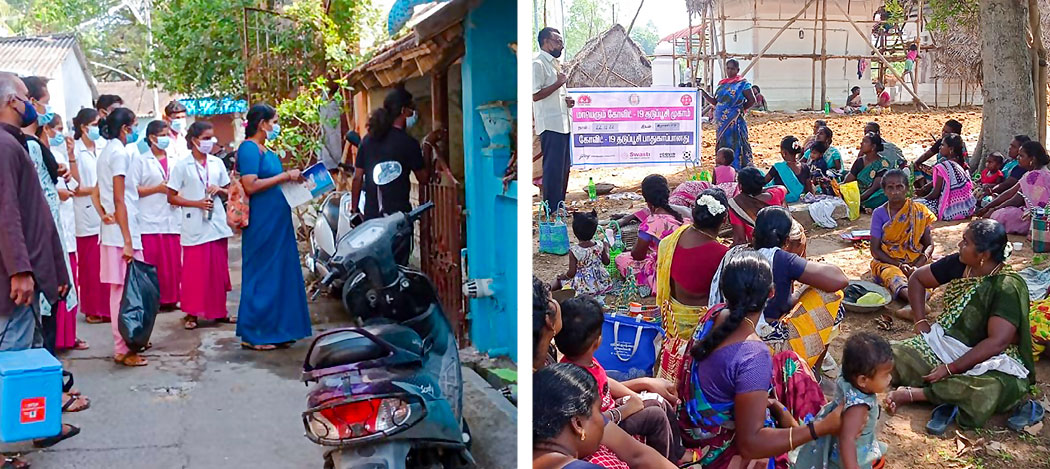
Strengthening business outcomes
Ensuring vaccination for all
The need
Vaccination is our best defence against severe symptoms and implications of COVID-19. The Government of India’s campaign to drive vaccination was massive, but there were significant delays in reaching the most vulnerable people such as those with disabilities, transgenders, fisherfolk communities, migrants, street vendors, construction workers, daily wagers, and domestic help, among others, who have specific requirements and beliefs, and therefore get underserved. At GCPL, we fully appreciated the fact that without accelerated vaccination, we wouldn’t be able to fight the pandemic, and the vaccination process might have kept rolling on for years.
The solution
To support vulnerable communities around our factories and warehouses, we partnered with Swasti Health Catalyst to help vaccinate over 1,05,000 vulnerable people. This includes 30,000 people in Cuddalore and Karaikal blocks of Puducherry who faced barriers to access the vaccine and were at higher risk of contracting COVID-19.
We adopted an agile, inclusive, and community-centric approach and engaged local community champions, leaders, and influencers (including faith-based organisations) to effectively facilitate end-to-end vaccination by mobilising people to vaccination sites and camps, providing logistic support for organising the camps, navigation support to members to reach the vaccine sites, and enrolling/registration assistance for people.
The programme aimed to bridge the gap by catering to the needs of individuals and tailored the interventions to suit their requirements, including completing necessary documentations such as enrollment/registration assistance for visually impaired people, enabling infrastructure (wheelchair-friendly centers) and doorstep vaccination, and facilitating the entire vaccination process with empathy by putting not just individuals but entire communities at the forefront.
Partnering with local healthcare workers to
offer door-to-door vaccination services
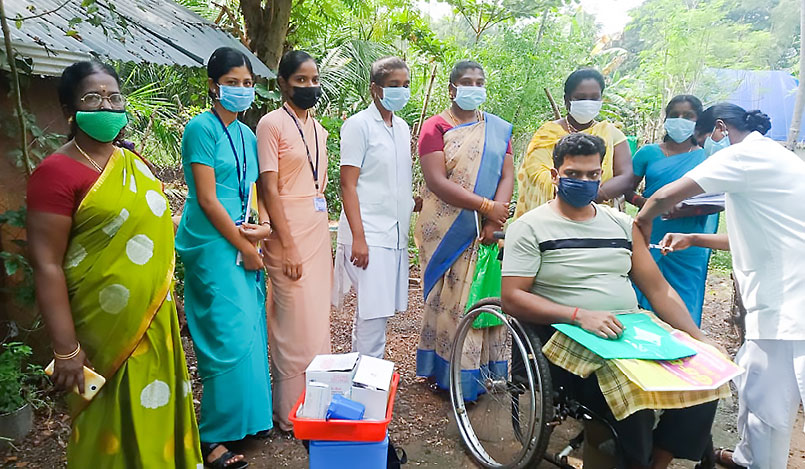
II. Ensuring judicious use of natural resources

As part of our Good & Green vision, we have identified environmental sustainability goals to be achieved by fiscal year 2025-26.
We will ensure one-third of all our products are greener than they were in 2020. We aim to be neutral on Scopes 1 and 2 carbon emissions, source at least 35% of our energy mix from renewable sources, improve energy efficiency by 100% in line with our EP100 commitment, and maintain our water positivity and zero waste to landfill status. Most significantly, we will also announce our commitment to the global science-based targets initiative and publish our roadmap and targets for emission reduction in line with the globally agreed 1.5-degree reduction scenario.
We track energy, emissions, water, waste, and renewable data for all the locations where we have 100% operational control. We are in the process of validating and imbibing carbon and water pricing to capture the financial implications of our emissions and water use and build sustainability into decision-making at every point in the value chain.
At the product level, we have started monitoring green parameters and are working on LCAs for products comprising 50% of our India revenue. Our teams are working on implementing opportunities identified in these LCA reports.
We have also extended our ESG parameters to our supply chain and are working closely with around 135 of our suppliers (covering 72% of our procurement spends) on improving their sustainability performance..
For more information on initiatives, please refer to the following:
Making our supply chain best-in-class > Sustainability of the process
Our goals and performance
1. Energy
- Reduce specific energy consumption by 40% (vs 2011 baseline)
- Increase renewable energy portfolio to 35% (vs 2011 baseline)
Approach
- Improve processes and increase the efficiency of systems
- Adopt green energy sources, such as solar and biomass
- Technology upgradation
Performance*#
- Reduced our specific energy consumption by 33%
- Increased our renewable energy portfolio to 29.4%
2. Water
Reduce water intensity by 40% (vs 2011 baseline) while maintaining water positivity
Approach
- Innovative water management systems, technological improvements, and integrated watershed management programme
Performance**#
- Reduced water intensity by 38% and achieved water positivity (we are conserving three times more water than we use in our operations through rainwater harvesting within our facilities and our community watershed programme).
3. Waste
Maintain zero waste to landfill and achieve zero liquid discharge
Approach
- Judicious and innovative use of materials, including reuse and recycle and greater circularity
Performance***#
- Reduced our specific waste to landfill by 100% (diverted 100% waste from landfill and have assessed the quantity of liquid discharge and developed a plan to achieve zero liquid discharge)
4. Emission
Reduce GHG emission intensity by 45% (vs 2011 baseline) and carbon neutrality for Scope 1 and 2 emissions
Approach
- Adopt cleaner fuels such as biomass and continually increase process efficiencies
Performance****#
- Reduced our GHG emissions intensity by 42%
5. Greener products
Ensure one-third of all our products are greener than they were in 2020
Approach
- Perform LCAs for products covering 80% of revenue
- Implement findings from LCA to reduce the environmental impact of our products, thus making them greener
Performance*****
- LCA conducted for products covering 50% of revenue
#Performance as on March 2022 against fiscal year 2010-11 baseline
*Energy use is calculated by specific energy consumption per tonne of production
**Water usage is calculated by specific water consumption per tonne of production
***Waste generated is calculated by specific waste to landfill per tonne of production
****Emissions are tracked for Scopes 1 and 2 and calculated by specific GHG emissions per tonne of production
*****LCAs for products covered by India revenue
III. Enhancing employability for beauty professionals

Our livelihood programmes focus on economic empowerment and are a part of our CSR initiatives.
They are guided by our Good & Green vision and our CSR policy and are reported under Schedule VII, Section 135 of the Companies Act, 2013 in the Directors’ Report. We follow a shared value approach that addresses the critical economic needs of marginalised and underprivileged sections of society by leveraging our expertise. By fiscal year 2025-26, we aim to empower another 2,00,000 women with beauty skills in emerging economies.
Salon-i and Beautypreneur in India
Salon-i and Beautypreneur are our flagship programmes that train and work with women in the beauty industry.
Salon-i is a vocational training programme for women. It is designed entirely in-house to train young women in basic skills of beauty, skin, hair care, and mehendi application. In addition, life skills and entrepreneurship development modules enable women to take up jobs or pursue self-employment depending on their unique skillsets and circumstances. Though Salon-i’s employability goal is small compared with the country’s overall need, the programme is unique as it specifically aims at employability, entrepreneurship, and empowerment of women. From 2012-13, we have trained over 2,27,300 young women. During fiscal year 2021-22, we restarted Salon-i after 18 months due to the impact of COVID-19 on the beauty sector. We trained a small batch of over 588 young girls this year.
A third-party impact assessment of Salon-i showed a three-fold increase in our trainees participating in paid work, from 14% to 45%, of which 78% were first-time entrants in the workforce.
As an extension of Salon-i, we support women micro entrepreneurs in the beauty and wellness sector in various parts of the country to grow their businesses. The Beautypreneur project aims to handhold nano entrepreneurs to help them stabilise and expand their enterprises. Since fiscal year 2016-17, we have supported over 4,910 women entrepreneurs and in 2021-22 we welcomed 750 new entrepreneurs to the cohort. In addition, we have expanded our work with barbers and have trained and supported over 130 young men in advanced hair styling skills and enterprise development.
A third-party impact assessment undertaken this year found that despite the pandemic, our programme saw a return of ₹7.75 for every rupee invested. Further, the study found:
- The median peak season monthly income of the entrepreneurs went up from ₹11,857 to ₹18,780 post the programme.
- Their average annual savings also rose over 40%, from ₹16,022 before the training to ₹22,683.
- Several Beautypreneurs stated that their technical skills have improved post training. Additionally, 83% rated their technical skills between 8 and 10 post training in comparison to pre-training, which was 24%.
- The average number of services a customer availed per visit before attending the training was 5.55, while the average number of services a customer availed after receiving the training was 6.90.
- 91% of Beautypreneurs stated that their business management skills have improved post training in comparison to 30% before training.
These results were achieved by introducing them to a package of practices to rationalise their service rates, personal care and hygiene standards, share ideas on how to attract and retain a client base, and train them on record keeping.
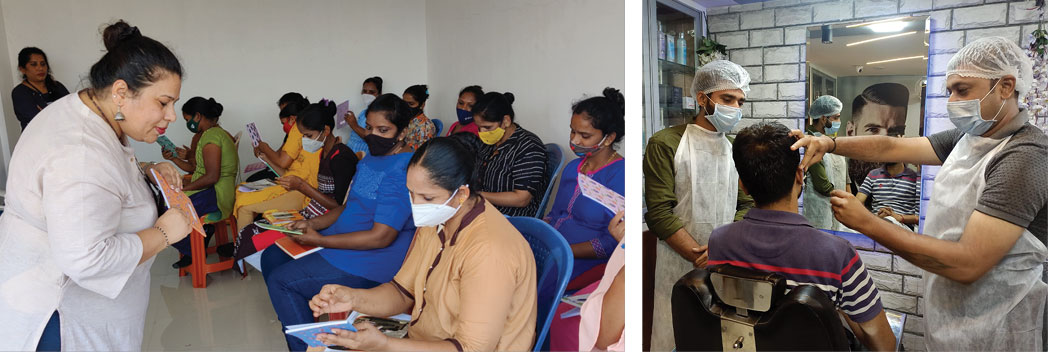
As part of our Beautypreneur and Barber programme, we have trained and supported hundreds of small-scale entrepreneurs
COVID-19 pivot
Our partner—Samhita Social Ventures—in their study revealed that the income of small beauty parlours led by women was down by 50% at 6 months after the first lockdown. These micro businesses are dependent on daily cash inflow to run their business. Moreover, their savings were exhausted during the first lockdown, and many reported job loss of their spouses, leaving them cash crunched. The second wave in India further compounded the scenario with many losing family members and/or having to deal with high medical bills.
In continuation of our partnership with Samhita’s Revive initiative—a returnable grant model that provides access to timely grants and technical assistance to people and small businesses—we supported 681 Beautypreneurs in fiscal year 2021-22. The financial assistance, ranging between ₹5,000 and ₹20,000 with a repayment period of 12 months, was used to buy safety equipment and salon consumables and, in some cases, to diversify into a new income stream, such as tailoring or catering.
Through this process, the women have also learned important digital and financial skills. More than 75% of the Beautypreneurs have repaid the returnable grants they have availed. After the devastating second wave of COVID-19, we issued a moratorium to ease the burden of repayment.
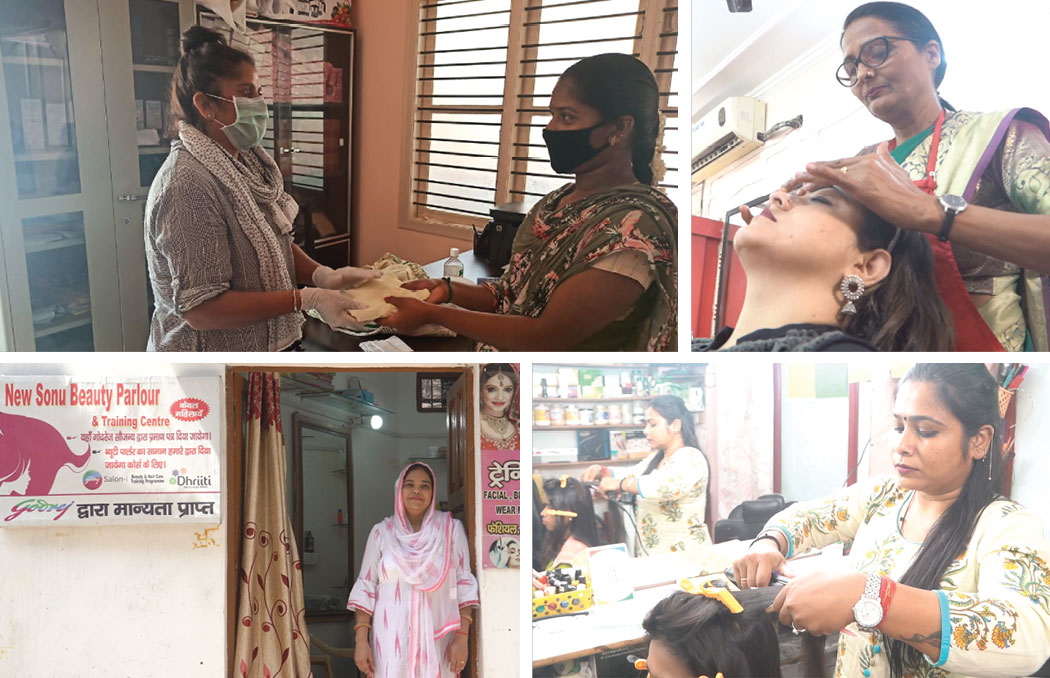
Supporting small beauty parlours through COVID-19 with returnable grants assistance
Training programmes
in Africa
Our Darling Academy (hairstyling skills training for youth) programme is aimed at youth empowerment through employability to tackle unemployment and poverty in Africa. The programme originally began in Kenya, and this year, it has expanded to Nigeria and the Republic of South Africa.
The Darling Stylists’ Academy focuses on skilling youth from poor socio-economic backgrounds. To have a uniform transformative experience for all trainees, the GCPL GAUM CSR and brand teams have crafted and standardised training manuals for trainee experience, training centre operation, and governance. In addition to training, the trainees are provided start-up kits and avenues for placement within our salon network. Across the cluster, we are aiming to train 20,000 new stylists by 2025.
In Kenya, the programme is a way of providing support to young mothers and girls from poor backgrounds who dropped out of school with no formal skills or stable income sources. The programme runs 27 centres, and over the years, it has helped over 5,350 women start working at a job or build their own salon. In fiscal year 2021-22, we trained 1,050 young women. In addition to our own centres and partnerships with county government vocational training centres, the team set up a knowledge partnership with a local NGO, and this year, it trained 27 students of whom 10 have been placed in salons.
In Nigeria, we have trained 128 women, and a survey of 30 alumni revealed that 97% of alumni experienced an increase in their income and attributed it to the Darling Academy training.
In South Africa, the team started its first batch with 20 young women from weak socio-economic backgrounds. In total, 18 trainees completed the 3-month intense programme after successfully meeting the training outcomes. Most of the women are looking to set up their own hairstyling businesses. Our South Africa brand team has provided them with a start-up kit and will continue to support them by exploring avenues of placement in our salon network.
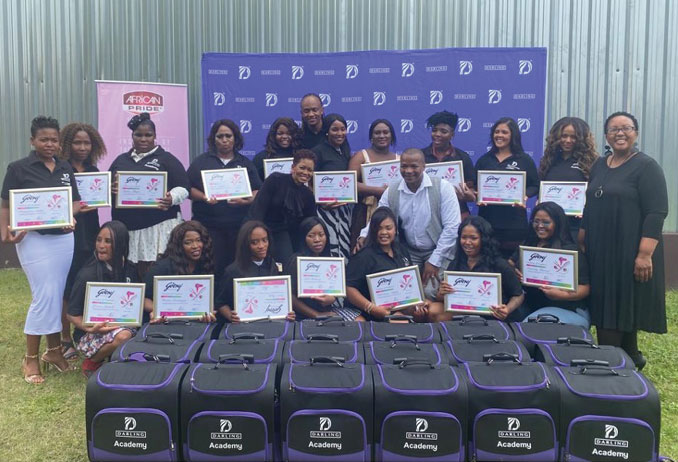
The Darling Stylists’ Academy focuses on skilling of youth from poor socio-economic backgrounds in Africa
IV. Protecting people from vector-borne diseases

Overview
Project EMBED started in 2015 in Madhya Pradesh in partnership with the Ministry of Health & Family Welfare’s National Centre for Vector Borne Diseases Control (erstwhile NVBDCP) focusing on malaria elimination in line with the Government of India’s mission. Over the past 6 years, we extended our initiative to Uttar Pradesh and Chhattisgarh, and in the fiscal year 2020-21, we also focused on dengue and chikungunya prevention in urban areas. We collaborate with NGOs and state governments to run intensive behaviour change programmes in regions with a high annual parasite index, where the case burden is the highest. We work in each location for 3 years, spreading awareness among households and people at the bottom of the pyramid and those from vulnerable and marginalised groups.
Our urban dengue and chikungunya project in four cities focuses on increasing the awareness of urban poor communities regarding the spread of mosquito-borne diseases and educating them regarding how to keep their families and communities safe. The project currently runs in Bhopal and Gwalior in Madhya Pradesh and Lucknow and Kanpur in Uttar Pradesh. It aims to reduce dengue and chikungunya cases and associated mortality.
The interventions under this project cover:
- Home visits to provide education and awareness on the diseases and prevention
- Community campaigns for mass awareness
- Digital outreach with SMS, WhatsApp, interactive voice response, and community radio
- Training public healthcare providers
- Engaging with private healthcare practitioners
- Engaging with local public health authorities, schools and colleges, resident welfare associations, and professional associations
Our third project under EMBED focused on providing technical support to the Government of India and Government of Uttar Pradesh to help develop an integrated vector management protocol and support the roll out of the same in endemic states. This project aims to:
- Develop integrated vector management (IVM) protocols for short and long-term interventions
- Information, education, and communication of and behaviour change communication activities for at-risk communities by using an IVM approach to vector-borne disease control
- Strengthen existing health systems and providers through capacity building on case identification, treatment, and referral and providing technical support
- Foster sustainable partnerships across multi-sectoral stakeholders to employ a collaborative approach
- Built the capacity of the state and district for outbreak investigation and management
In 2015, Madhya Pradesh was a Category 3 state with high malaria incidence. In 2021, it has been declared a Category 1 state and is well on its way to eliminate malaria. Our EMBED programme has been the only private-funded malaria elimination programme running in Madhya Pradesh since 2015 in partnership with the Government of Madhya Pradesh. Between 2015 and 2020, the malaria caseload in the state has reduced by 93.28%, with malaria deaths reducing by 95.83%. This is the highest percentage drop in malaria cases in a state in India during this time period.
Through the successful implementation of all three projects, by the fiscal year 2025-26, we aim to protect 30 million people against vector-borne diseases.
COVID-19 pivot
During the second wave of COVID-19 from April to June 2021, we distributed hand sanitizers to frontline workers, healthcare providers, and community members. We raised awareness and mobilised communities for COVID-19 vaccination and following COVID-19-appropriate behaviour. Numerous people were vaccinated due to the mobilisation carried out by our programme team. Additionally, we supported fever screening along with healthcare providers, linking fever cases for testing and treatment services and following up home isolation cases with local healthcare (Accredited Social Health Activist, ASHA) workers.
We conducted a third-party impact assessment of the rural malaria intervention in 4 districts of Madhya Pradesh, namely Shivpuri, Sheopur, Alirajpur, and Jhabua—one and a half years post completion of project from December 2021 to February 2022. The study revealed that community awareness about malaria symptoms remains high at 98%, and testing for malaria when people have fever is at 70% among the respondents.
This has led to frequent testing, timely treatment, and faster recovery. Of the households that participated in the study, 92% are actively taking measures to keep their house and surroundings clean to ensure there are no mosquito-breeding spaces in the community.
The SROI value for the overall programme is ₹12.57, that is, for every rupee invested, the programme provides a value of ₹12.57.
Outreach
- In fiscal year 2021-22, our rural malaria programmes reached out to 1,32,759 households in 778 villages in 7 districts across Madhya Pradesh, Uttar Pradesh, and Chattisgarh.
- Our urban dengue programme reached out to 71,199 households in 406 urban settlements and 4 cities in Uttar Pradesh and Madhya Pradesh.
- Through technical support we offered to the Government of India and Government of Uttar Pradesh on the integrated vector management project, we reached out to 7 million people.
- In total, 1,083 ASHA workers were trained in the prevention and control methods of vector-borne diseases.
- In total, 522 participants attended training on entomological surveillance, clinical management of malaria, and outbreak investigation.
- We carried out 10 outbreak surveillance visits with the NVBDCP and the Government of Uttar Pradesh to manage dengue and Zika outbreaks.
Impact
- In our rural malaria project, while we have met the target of zero malaria cases in 2 of 7 districts (Shivpuri and Sheopur). Additionally, all districts have shown a remarkable drop in the number of positive malaria cases (between 12% and 95% across districts). Similarly, the slide positivity rate has also reduced in all intervention districts (56%-98%) and testing rates have increased by anywhere between 8% and 510% across the districts.
- In our urban dengue project, dengue outbreaks occured across all intervention geographies, with Zika occuring in a couple of locations. Changing rainfall patterns and intermittent preventive measures due to focus on COVID-19 created perfect conditions for mosquitoes to thrive. Our implementation partners worked in tandem with the local government to carry out outbreak surveillance and management, identify and implement strategies for source reduction, and train local teams including domestic breeder checkers, ASHA workers, and community volunteers to help contain the outbreaks and limit damage.
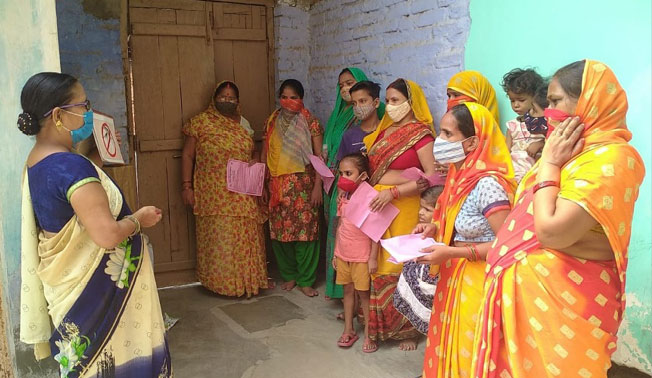
Creating awareness around vector-borne diseases through Project EMBED
V. Enabling sustainable communities

A significant focus of our CSR programmes is to work towards the sustainable development of communities to ensure that current needs are met without compromising future requirements.
Our programmes look to address the challenges of climate change, urbanisation, and economic growth.
Waste management
Overview
Our efforts towards solid waste management extend beyond our manufacturing plants and immediate areas of operations. As part of our CSR efforts, we support community waste management projects, in partnership with local civic authorities, by using circular economy principles.
Since the fiscal year 2020-21, we have partnered with the Puducherry Municipal Corporation to implement a community waste management project. We have reached out to 16 wards in 3 zones of Puducherry covering over 35,000 people. We are digitally tracking the waste management process and raising awareness on door-to-door collection and source segregation.
We have diverted over 7,300 kg of waste from landfills through clean-up drives and have established a sanitation park. We provided 204 waste workers with occupational ID cards, and 26 workers enrolled on the PMJAY welfare scheme, which has unlocked a cover of ₹5 lakhs per family per year.
Under the project, we have established a sanitation park or advanced segregation centre, in partnership with the Municipal Corporation. Through this centre, we aim to scientifically manage 140 metric tonnes of waste per day from Puducherry to work towards a circular economy ecosystem for the city.
We are also working with a social enterprise in Guwahati to recycle forest and agri residue into briquettes for use as biofuel, and in another project to convert plastic waste into fuel. Through this project, we aim to divert 50 metric tonnes of waste per day from landfills by 2023. The facility is currently under construction and will be operational in fiscal year 2022-23.
Strengthening business outcomes
Scientific waste management
The need
Puducherry generates close to 170 MT of waste per day. The region is known for tourism and, as a result, experiences severe issues with littering. No waste was being segregated and everything ended up in landfills. There have been reports of fire outbreaks in the landfills, and residents often complain of constant filth, stench, and serious health issues they face due to their proximity to the landfill.
Before we initiated the waste management programme in partnership with the Puducherry Municipal Corporation and Recity (our implementation partner), the unsegregated waste was collected by the appointed Collection and Transportation Concessionaire, M/s Swachatha Corporation, and was deposited at the landfill. From the waste, the recyclable material was salvaged by waste collectors and sold to vendors in the informal market for recycling. Due to this, the remainder material was often of low value and, therefore, left behind, further increasing the burden of waste and disease.
The solution
Our integrated waste management programme approach is three-fold. It aims to divert waste from landfills, professionalise waste workers, and ensure a sustainable waste management business model. To divert the waste from landfill, we built a sanitation park with our partner, Recity.
This sanitation park has been scientifically planned and ensures that the segregated waste is sorted into different material types, baled to ensure optimal logistics, and sent to appropriate end-of-life solutions through various partnerships. The Facility Management Solutions helps keep record of material movement offering insights on eliminating redundancies and deriving maximum visibility of snags, if any. By July 2022, the sanitation park will process 4 MT waste/day.
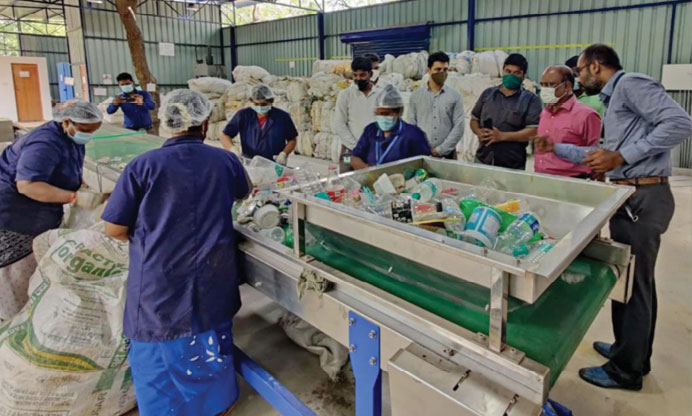
Sanitation Park at Puducherry
Watershed management
Overview
Our integrated watershed development project is helping restore the ecological balance in the drought-prone district of Siddipet in Telangana. Currently, groundwater levels are lower than 400 ft in many areas, and as a result, farmers are under acute pressure. We are partnering with NABARD and a local NGO to rejuvenate the land, recharge groundwater levels, facilitate necessary irrigation, increase cropping cycles, improve the quality and quantity of produce, enhance livelihoods, and ensure sustainable agriculture practices.
Output
We have completed treating 1,486 hectares of land covering 46% of the total area under the project. To date, we have provided over 6 lakh saplings for direct and seed dibbling.
We brought 150 acres of barren land into cultivation through water table improvement by approximately 15 ft. Vegetable cultivation also increased from 5 acres of land to 23 acres. To diversify their income, we enabled 40 women farmers to avail livelihood loans between ₹20,000 and ₹50,000 for dairy farming, setting up general stores, etc.
We also captured 1.5 million KL of water in the fiscal year 2021-22, which has helped GCPL become a water-positive company.
By fiscal year 2023-24, we aim to treat 3,234 hectares of land, conserve 3.5 million KL of water per year, sink 30,000 tCO2 per annum, as well as build the capacity of the whole community on water management and sustainable agriculture.
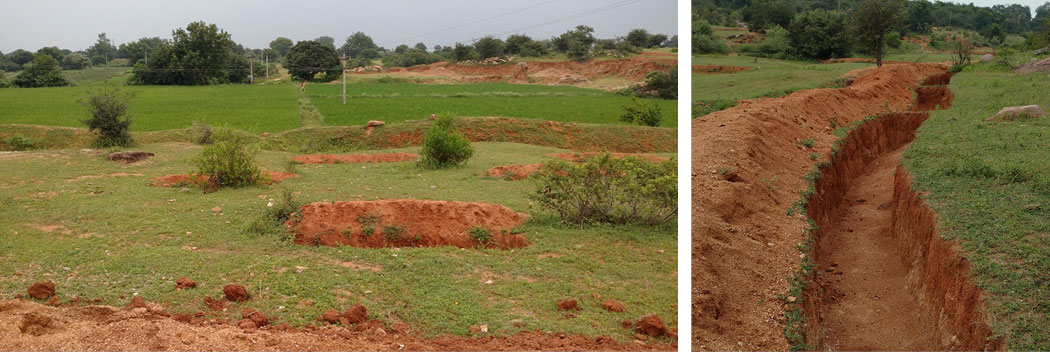
Watershed structures in Siddipet, Telengana
Community initiatives
Overview
Another focus of our CSR programme is working closely in communities around our manufacturing plants.
Around our flagship plant in Malanpur, we rolled out a WASH initiative led by youth called ‘Youth ki Awaaz’. The project aims to bring about behavioural change regarding hygiene, sanitation, and waste management. It is led by young people to bring about change in overall public health parameters in the three villages around our plant.
In response to the second wave of COVID-19, the project pivoted to a local response initiative led by 81 young people to mobilise and raise awareness on vaccinations by reaching out to over 2,000 people in intervention villages. The project team was issued identity cards from the health department and has been working closely with Gram Panchayats, Panchayat Secretaries, Public Distribution Shops, and ASHA and Anganwadi workers.
Youth from the local villages participated in water and sanitation activities such as repairing handpumps, cleaning drainage, cleaning garbage dumps, and engaging school children to reduce single-use plastic. The programme also organised adolescent health and menstrual hygiene awareness camps. Over 300 girls were trained, and sanitary napkins were made available to them. The youth also raised community awareness on single-use plastic and reached out to over 1,100 households. In addition, we engaged school children on various WASH activities and awareness drives.
Around our Baddi plant in our North Cluster, we recently built a public toilet and washroom facility for the community centre around our plant. The community centre caters to the people of Baddi and neighbouring villages and can accommodate close to 450 people. The maintenance of public toilets is usually a concern as the structures depreciate quickly because of the lack of water, proper drainage, and/or regular maintenance.
We’re working closely with the local community to put in place systems for maintenance of the community centre, as well as the toilet facility. We’ve ensured adequate water and sewage connections for ease of use. This is a permanent structure and our team on ground will make periodic visits and volunteer to ensure the facilities are maintained properly.
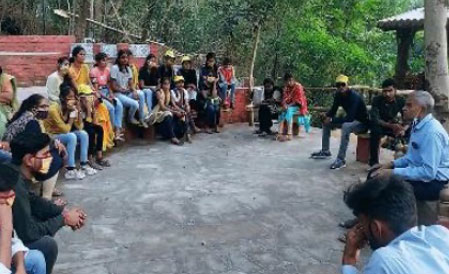
Training young community volunteers as part of our YUVA initiative
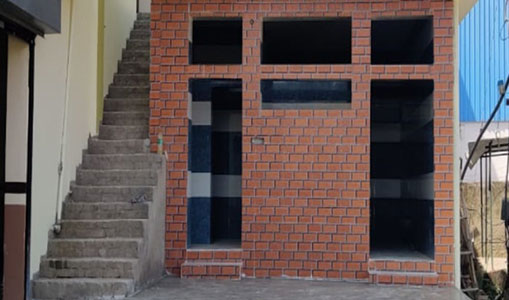
Community toilet constructed in Baddi
VI. Fostering volunteerism

Our multi-faceted volunteering platform provides a range of opportunities for Godrejites to contribute their time and skills in community activities.
Like the last year, we had limited our volunteering opportunities to the digital medium.
Godrej Global Volunteering Day
This is our annual day of community service across the Godrej Industries Group. Since 2020, we have moved the activities online to adhere to COVID-19 safety protocols and to keep our teams and communities safe. Our theme for the past 2 years has been sustainable living in line with our 2025 Good & Green goals, and we ran the challenge across 1 week in December. In 2021, over 220 of our team members across the globe volunteered from their homes. Our volunteering week focused on tiny tasks on sustainable living that could be done from anywhere and at any time.
We hosted 60 tasks on the portal, and across the Group, we had over 1,800 volunteers that helped save 16,420 litres of water, 55,142 kWh of electricity, and 2,311 kg of waste. We also got healthier, as we burned 43,840 calories and took time off for self-care.
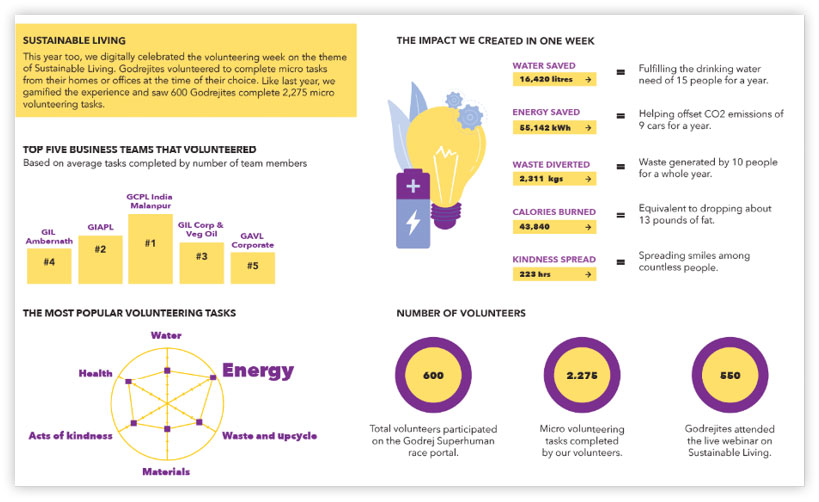
Impact we created through our virtual
Godrej Global Volunteering Week 2021
Brighter Giving
These are one-time volunteering opportunities to help make a meaningful impact with your skills. Our volunteers provided career counselling, academic mentoring, and online fitness or a creative class, among other activities. In fiscal year 2021-22, 55 of our team members across our teams volunteered for a range of virtual volunteering activities.
World Environment Day
We celebrated World Environment Week online during the week of June 5, 2021 and explored the theme of biodiversity. We hosted a webinar on how individuals can connect with nature around them and hosted a photography and quiz contest. Over 200 of our team members participated over the week.
Daan Utsav and Payroll Giving
In total, 87 of our GCPL team members participated in Daan Utsav through one-time donations, buying hand-made products from our NGO partner, participating in awareness session webinars, volunteering and signing up for Workplace Giving, and supporting our NGO partners with a fixed monthly donation.
Awards
- Awarded ESG India Leadership Award 2021 for Leadership in Governance Issues by ESG Risk Assessments & Insights.
- Ranked #1 in CSR Journal’s annual ranking of companies for CSR and Sustainability
- Ranked India’s top Company for Sustainability and CSR 2021 by Futurescape
- One of BW Businessworld India’s Most Sustainable Companies 2022
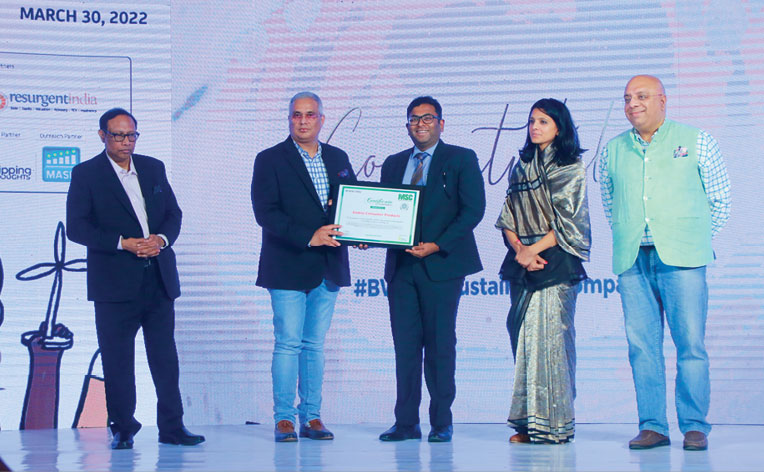
We were one of BW Businessworld India’s Most Sustainable Companies 2022

I. COVID-19 recovery initiatives to
revive livelihoods and COVID-19
vaccination awareness
The impact of COVID-19 has been felt as a public health crisis of unprecedented proportions. It is also a long-term economic disaster impacting the lives and livelihoods of billions of people worldwide. Even when vaccinations began, people from low-income and underserved communities were left behind. In emerging markets where GCPL operates, this is further complicated by pre-existing inequalities.
Livelihood recovery and revival programmes
We provided need-based food relief kits to the most vulnerable in the geographies of key interest, such as around our manufacturing units, offices, and warehousing facilities. Furthermore, we provided support such as livelihood recovery training, access to returnable grants, training on business recovery, and handholding nano and micro entrepreneurs to ensure they were able to successfully emerge from the second and third COVID-19 waves in India.
Responding to the need of the most vulnerable communities such as informal sector workers, domestic help, and other such communities, we provided 6,365 food kits to people across Goa, Gujarat, Jammu & Kashmir, Karnataka, Kerala, Maharashtra, Rajasthan, Uttar Pradesh, Uttarakhand, and West Bengal. Moreover, we donated medical equipment (such as ventilators, oxygen concentrators, hospital beds, and intensive-care-unit monitors) and consumables worth ₹2.5 crore to 20 hospitals in key locations for GCPL pan-India. Finally, 4.94 lakh units of masks, sanitisers, and soaps were distributed during the second wave to frontline workers and the most vulnerable communities.

Donating food supplies among local
communities in India
In Kolkata and Guwahati, we provided livelihood recovery training and support to 7,166 street vendors—one of the most vulnerable and at-risk occupation groups within the informal sector workers. We trained them on health, hygiene, safe product handling, proper waste disposal, business and financial literacy, and digital payment methods. We also raised awareness on various social entitlements and social protection schemes available to them, and over 1,600 people applied for various schemes and entitlements.
In Thane and Palghar, we mobilised 90 entrepreneurs to establish micro enterprises in rural areas that will positively impact over 600 people and help them set up market platforms. The project has a special focus on women and returned migrant worker-led enterprises. We developed enterprises in farm produce value addition, aggregation, and trading. We are also creating marketplaces for rural entrepreneurs by setting up farmer markets. These pop-up marketplaces
will help connect buyers (urban India) and sellers (from rural India), leading to responsible consumption and production. Close to 75% of the entrepreneurs are active, and we are enabling their access to finance and government schemes.
In Baddi, Jammu, Pune, and Lucknow, we helped provide formal sector jobs to 3,353 out-of-work adults and enabled 1,575 adolescents to stay in school. We placed 3,228 people in the formal sector with an average salary of ₹11,367. We engaged with adolescents and provided learning opportunities, enhancing their life skills, and building their resilience

We provided relief packages and hygiene essentials to people from vulnerable communities

We donated critical medical
equipment to hospitals across India

Enabling access to entitlements
National and state governments have announced various welfare schemes for those who have been hit the hardest by the pandemic, and we are working with our non-profit partners to unlock these funds.
In Mumbai, we provided support to 4,993 individuals to get government identity documents (IDs) and avail access to entitlements. This has unlocked over ₹34 lakhs for the people and their families.
In Malanpur, we set up an entitlement facilitation centre to ensure people get access to and avail their basic entitlements of various state and central government welfare schemes. The project identified individuals and capacitated, trained, and handheld them to avail entitlements. We helped submit over 700 applications, which unlocked close to ₹1.3 lakhs in provident fund claims, savings of ₹2.5 lakhs, and insurance cover of ₹2.45 crore.
Raising vaccination awareness
As vaccines are our best bet to fight COVID-19, we started vaccination awareness drives in communities around several of our manufacturing plants and warehousing facilities across 6 states of India.
In Andhra Pradesh, Karnataka, Puducherry, Telangana, Tamil Nadu, and Assam, we partnered with NGOs and local government healthcare workers to raise awareness and enable door-to-door vaccination services to low-income and underserved communities that have so far been left out. We have reached out to over 1,05,000 people and helped them get vaccinated.
Building vaccine awareness among
underserved and vulnerable communities

Strengthening business outcomes
Ensuring vaccination for all
The need
Vaccination is our best defence against severe symptoms and implications of COVID-19. The Government of India’s campaign to drive vaccination was massive, but there were significant delays in reaching the most vulnerable people such as those with disabilities, transgenders, fisherfolk communities, migrants, street vendors, construction workers, daily wagers, and domestic help, among others, who have specific requirements and beliefs, and therefore get underserved. At GCPL, we fully appreciated the fact that without accelerated vaccination, we wouldn’t be able to fight the pandemic, and the vaccination process might have kept rolling on for years.
The solution
To support vulnerable communities around our factories and warehouses, we partnered with Swasti Health Catalyst to help vaccinate over 1,05,000 vulnerable people. This includes 30,000 people in Cuddalore and Karaikal blocks of Puducherry who faced barriers to access the vaccine and were at higher risk of contracting COVID-19.
We adopted an agile, inclusive, and community-centric approach and engaged local community champions, leaders, and influencers (including faith-based organisations) to effectively facilitate end-to-end vaccination by mobilising people to vaccination sites and camps, providing logistic support for organising the camps, navigation support to members to reach the vaccine sites, and enrolling/registration assistance for people.
The programme aimed to bridge the gap by catering to the needs of individuals and tailored the interventions to suit their requirements, including completing necessary documentations such as enrollment/registration assistance for visually impaired people, enabling infrastructure (wheelchair-friendly centers) and doorstep vaccination, and facilitating the entire vaccination process with empathy by putting not just individuals but entire communities at the forefront.
Partnering with local healthcare workers to
offer door-to-door vaccination services


II. Ensuring judicious
use of natural
resources
As part of our Good & Green vision, we have identified environmental sustainability goals to be achieved by fiscal year 2025-26. We will ensure one-third of all our products are greener than they were in 2020. We aim to be neutral on Scopes 1 and 2 carbon emissions, source at least 35% of our energy mix from renewable sources, improve energy efficiency by 100% in line with our EP100 commitment, and maintain our water positivity and zero waste to landfill status. Most significantly, we will also announce our commitment to the global science-based targets initiative and publish our roadmap and targets for emission reduction in line with the globally agreed 1.5-degree reduction scenario.
We track energy, emissions, water, waste, and renewable data for all the locations where we have 100% operational control. We are in the process of validating and imbibing carbon and water pricing to capture the financial implications of our emissions and water use and build sustainability into decision-making at every point in the value chain.
At the product level, we have started monitoring green parameters and are working on LCAs for products comprising 50% of our India revenue. Our teams are working on implementing opportunities identified in these LCA reports.
We have also extended our ESG parameters to our supply chain and are working closely with around 135 of our suppliers (covering 72% of our procurement spends) on improving their sustainability performance..
For more information on initiatives, please refer to the following:
Making our supply chain best-in-class > Sustainability of the process
Our goals and performance
1. Energy
- Reduce specific energy consumption by 40% (vs 2011 baseline)
- Increase renewable energy portfolio to 35% (vs 2011 baseline)
Approach
- Improve processes and increase the efficiency of systems
- Adopt green energy sources, such as solar and biomass
- Technology upgradation
Performance*#
- Reduced our specific energy consumption by 33%
- Increased our renewable energy portfolio to 29.4%
2. Water
Reduce water intensity by 40% (vs 2011 baseline) while maintaining water positivity
Approach
- Innovative water management systems, technological improvements, and integrated watershed management programme
Performance**#
- Reduced water intensity by 38% and achieved water positivity (we are conserving three times more water than we use in our operations through rainwater harvesting within our facilities and our community watershed programme).
3. Waste
Maintain zero waste to landfill and achieve zero liquid discharge
Approach
- Judicious and innovative use of materials, including reuse and recycle and greater circularity
Performance***#
- Reduced our specific waste to landfill by 100% (diverted 100% waste from landfill and have assessed the quantity of liquid discharge and developed a plan to achieve zero liquid discharge)
4. Emission
Reduce GHG emission intensity by 45% (vs 2011 baseline) and carbon neutrality for Scope 1 and 2 emissions
Approach
- Adopt cleaner fuels such as biomass and continually increase process efficiencies
Performance****#
- Reduced our GHG emissions intensity by 42%
5. Greener products
Ensure one-third of all our products are greener than they were in 2020
Approach
- Perform LCAs for products covering 80% of revenue
- Implement findings from LCA to reduce the environmental impact of our products, thus making them greener
Performance*****
- LCA conducted for products covering 50% of revenue
#Performance as on March 2022 against fiscal year 2010-11 baseline
*Energy use is calculated by specific energy consumption per tonne of production
**Water usage is calculated by specific water consumption per tonne of production
***Waste generated is calculated by specific waste to landfill per tonne of production
****Emissions are tracked for Scopes 1 and 2 and calculated by specific GHG emissions per tonne of production
*****LCAs for products covered by India revenue

III. Enhancing
employability for
beauty professionals
Our livelihood programmes focus on economic empowerment and are a part of our CSR initiatives. They are guided by our Good & Green vision and our CSR policy and are reported under Schedule VII, Section 135 of the Companies Act, 2013 in the Directors’ Report. We follow a shared value approach that addresses the critical economic needs of marginalised and underprivileged sections of society by leveraging our expertise. By fiscal year 2025-26, we aim to empower another 2,00,000 women with beauty skills in emerging economies.
Salon-i and Beautypreneur in India
Salon-i and Beautypreneur are our flagship programmes that train and work with women in the beauty industry.
Salon-i is a vocational training programme for women. It is designed entirely in-house to train young women in basic skills of beauty, skin, hair care, and mehendi application. In addition, life skills and entrepreneurship development modules enable women to take up jobs or pursue self-employment depending on their unique skillsets and circumstances. Though Salon-i’s employability goal is small compared with the country’s overall need, the programme is unique as it specifically aims at employability, entrepreneurship, and empowerment of women. From 2012-13, we have trained over 2,27,300 young women. During fiscal year 2021-22, we restarted Salon-i after 18 months due to the impact of COVID-19 on the beauty sector. We trained a small batch of over 588 young girls this year.
A third-party impact assessment of Salon-i showed a three-fold increase in our trainees participating in paid work, from 14% to 45%, of which 78% were first-time entrants in the workforce.
As an extension of Salon-i, we support women micro entrepreneurs in the beauty and wellness sector in various parts of the country to grow their businesses. The Beautypreneur project aims to handhold nano entrepreneurs to help them stabilise and expand their enterprises. Since fiscal year 2016-17, we have supported over 4,910 women entrepreneurs and in 2021-22 we welcomed 750 new entrepreneurs to the cohort. In addition, we have expanded our work with barbers and have trained and supported over 130 young men in advanced hair styling skills and enterprise development.
A third-party impact assessment undertaken this year found that despite the pandemic, our programme saw a return of ₹7.75 for every rupee invested. Further, the study found:
- The median peak season monthly income of the entrepreneurs went up from ₹11,857 to ₹18,780 post the programme.
- Their average annual savings also rose over 40%, from ₹16,022 before the training to ₹22,683.
- Several Beautypreneurs stated that their technical skills have improved post training. Additionally, 83% rated their technical skills between 8 and 10 post training in comparison to pre-training, which was 24%.
- The average number of services a customer availed per visit before attending the training was 5.55, while the average number of services a customer availed after receiving the training was 6.90.
- 91% of Beautypreneurs stated that their business management skills have improved post training in comparison to 30% before training.
These results were achieved by introducing them to a package of practices to rationalise their service rates, personal care and hygiene standards, share ideas on how to attract and retain a client base, and train them on record keeping.

As part of our Beautypreneur and Barber programme, we have
trained and supported hundreds of small-scale entrepreneurs
COVID-19 pivot
Our partner—Samhita Social Ventures—in their study revealed that the income of small beauty parlours led by women was down by 50% at 6 months after the first lockdown. These micro businesses are dependent on daily cash inflow to run their business. Moreover, their savings were exhausted during the first lockdown, and many reported job loss of their spouses, leaving them cash crunched. The second wave in India further compounded the scenario with many losing family members and/or having to deal with high medical bills.
In continuation of our partnership with Samhita’s Revive initiative—a returnable grant model that provides access to timely grants and technical assistance to people and small businesses—we supported 681 Beautypreneurs in fiscal year 2021-22. The financial assistance, ranging between ₹5,000 and ₹20,000 with a repayment period of 12 months, was used to buy safety equipment and salon consumables and, in some cases, to diversify into a new income stream, such as tailoring or catering.
Through this process, the women have also learned important digital and financial skills. More than 75% of the Beautypreneurs have repaid the returnable grants they have availed. After the devastating second wave of COVID-19, we issued a moratorium to ease the burden of repayment.

Supporting small beauty parlours through
COVID-19 with returnable grants assistance
Training programmes
in Africa
Our Darling Academy (hairstyling skills training for youth) programme is aimed at youth empowerment through employability to tackle unemployment and poverty in Africa. The programme originally began in Kenya, and this year, it has expanded to Nigeria and the Republic of South Africa.
The Darling Stylists’ Academy focuses on skilling youth from poor socio-economic backgrounds. To have a uniform transformative experience for all trainees, the GCPL GAUM CSR and brand teams have crafted and standardised training manuals for trainee experience, training centre operation, and governance. In addition to training, the trainees are provided start-up kits and avenues for placement within our salon network. Across the cluster, we are aiming to train 20,000 new stylists by 2025.
In Kenya, the programme is a way of providing support to young mothers and girls from poor backgrounds who dropped out of school with no formal skills or stable income sources. The programme runs 27 centres, and over the years, it has helped over 5,350 women start working at a job or build their own salon. In fiscal year 2021-22, we trained 1,050 young women. In addition to our own centres and partnerships with county government vocational training centres, the team set up a knowledge partnership with a local NGO, and this year, it trained 27 students of whom 10 have been placed in salons.
In Nigeria, we have trained 128 women, and a survey of 30 alumni revealed that 97% of alumni experienced an increase in their income and attributed it to the Darling Academy training.
In South Africa, the team started its first batch with 20 young women from weak socio-economic backgrounds. In total, 18 trainees completed the 3-month intense programme after successfully meeting the training outcomes. Most of the women are looking to set up their own hairstyling businesses. Our South Africa brand team has provided them with a start-up kit and will continue to support them by exploring avenues of placement in our salon network.

The Darling Stylists’ Academy focuses
on skilling of youth from poor
socio-economic backgrounds in Africa

IV. Protecting people
from vector-borne
diseases
Overview
Project EMBED started in 2015 in Madhya Pradesh in partnership with the Ministry of Health & Family Welfare’s National Centre for Vector Borne Diseases Control (erstwhile NVBDCP) focusing on malaria elimination in line with the Government of India’s mission. Over the past 6 years, we extended our initiative to Uttar Pradesh and Chhattisgarh, and in the fiscal year 2020-21, we also focused on dengue and chikungunya prevention in urban areas. We collaborate with NGOs and state governments to run intensive behaviour change programmes in regions with a high annual parasite index, where the case burden is the highest. We work in each location for 3 years, spreading awareness among households and people at the bottom of the pyramid and those from vulnerable and marginalised groups.
Our urban dengue and chikungunya project in four cities focuses on increasing the awareness of urban poor communities regarding the spread of mosquito-borne diseases and educating them regarding how to keep their families and communities safe. The project currently runs in Bhopal and Gwalior in Madhya Pradesh and Lucknow and Kanpur in Uttar Pradesh. It aims to reduce dengue and chikungunya cases and associated mortality.
The interventions under this project cover:
- Home visits to provide education and awareness on the diseases and prevention
- Community campaigns for mass awareness
- Digital outreach with SMS, WhatsApp, interactive voice response, and community radio
- Training public healthcare providers
- Engaging with private healthcare practitioners
- Engaging with local public health authorities, schools and colleges, resident welfare associations, and professional associations
Our third project under EMBED focused on providing technical support to the Government of India and Government of Uttar Pradesh to help develop an integrated vector management protocol and support the roll out of the same in endemic states. This project aims to:
- Develop integrated vector management (IVM) protocols for short and long-term interventions
- Information, education, and communication of and behaviour change communication activities for at-risk communities by using an IVM approach to vector-borne disease control
- Strengthen existing health systems and providers through capacity building on case identification, treatment, and referral and providing technical support
- Foster sustainable partnerships across multi-sectoral stakeholders to employ a collaborative approach
- Built the capacity of the state and district for outbreak investigation and management
In 2015, Madhya Pradesh was a Category 3 state with high malaria incidence. In 2021, it has been declared a Category 1 state and is well on its way to eliminate malaria. Our EMBED programme has been the only private-funded malaria elimination programme running in Madhya Pradesh since 2015 in partnership with the Government of Madhya Pradesh. Between 2015 and 2020, the malaria caseload in the state has reduced by 93.28%, with malaria deaths reducing by 95.83%. This is the highest percentage drop in malaria cases in a state in India during this time period.
Through the successful implementation of all three projects, by the fiscal year 2025-26, we aim to protect 30 million people against vector-borne diseases.
COVID-19 pivot
During the second wave of COVID-19 from April to June 2021, we distributed hand sanitizers to frontline workers, healthcare providers, and community members. We raised awareness and mobilised communities for COVID-19 vaccination and following COVID-19-appropriate behaviour. Numerous people were vaccinated due to the mobilisation carried out by our programme team. Additionally, we supported fever screening along with healthcare providers, linking fever cases for testing and treatment services and following up home isolation cases with local healthcare (Accredited Social Health Activist, ASHA) workers.
We conducted a third-party impact assessment of the rural malaria intervention in 4 districts of Madhya Pradesh, namely Shivpuri, Sheopur, Alirajpur, and Jhabua—one and a half years post completion of project from December 2021 to February 2022. The study revealed that community awareness about malaria symptoms remains high at 98%, and testing for malaria when people have fever is at 70% among the respondents.
This has led to frequent testing, timely treatment, and faster recovery. Of the households that participated in the study, 92% are actively taking measures to keep their house and surroundings clean to ensure there are no mosquito-breeding spaces in the community.
The SROI value for the overall programme is ₹12.57, that is, for every rupee invested, the programme provides a value of ₹12.57.
Outreach
- In fiscal year 2021-22, our rural malaria programmes reached out to 1,32,759 households in 778 villages in 7 districts across Madhya Pradesh, Uttar Pradesh, and Chattisgarh.
- Our urban dengue programme reached out to 71,199 households in 406 urban settlements and 4 cities in Uttar Pradesh and Madhya Pradesh.
- Through technical support we offered to the Government of India and Government of Uttar Pradesh on the integrated vector management project, we reached out to 7 million people.
- In total, 1,083 ASHA workers were trained in the prevention and control methods of vector-borne diseases.
- In total, 522 participants attended training on entomological surveillance, clinical management of malaria, and outbreak investigation.
- We carried out 10 outbreak surveillance visits with the NVBDCP and the Government of Uttar Pradesh to manage dengue and Zika outbreaks.
Impact
- In our rural malaria project, while we have met the target of zero malaria cases in 2 of 7 districts (Shivpuri and Sheopur). Additionally, all districts have shown a remarkable drop in the number of positive malaria cases (between 12% and 95% across districts). Similarly, the slide positivity rate has also reduced in all intervention districts (56%-98%) and testing rates have increased by anywhere between 8% and 510% across the districts.
- In our urban dengue project, dengue outbreaks occured across all intervention geographies, with Zika occuring in a couple of locations. Changing rainfall patterns and intermittent preventive measures due to focus on COVID-19 created perfect conditions for mosquitoes to thrive. Our implementation partners worked in tandem with the local government to carry out outbreak surveillance and management, identify and implement strategies for source reduction, and train local teams including domestic breeder checkers, ASHA workers, and community volunteers to help contain the outbreaks and limit damage.

Creating awareness around vector-borne
diseases through Project EMBED

V. Enabling
sustainable
communities
A significant focus of our CSR programmes is to work towards the sustainable development of communities to ensure that current needs are met without compromising future requirements. Our programmes look to address the challenges of climate change, urbanisation, and economic growth.
Waste management
Overview
Our efforts towards solid waste management extend beyond our manufacturing plants and immediate areas of operations. As part of our CSR efforts, we support community waste management projects, in partnership with local civic authorities, by using circular economy principles.
Since the fiscal year 2020-21, we have partnered with the Puducherry Municipal Corporation to implement a community waste management project. We have reached out to 16 wards in 3 zones of Puducherry covering over 35,000 people. We are digitally tracking the waste management process and raising awareness on door-to-door collection and source segregation.
We have diverted over 7,300 kg of waste from landfills through clean-up drives and have established a sanitation park. We provided 204 waste workers with occupational ID cards, and 26 workers enrolled on the PMJAY welfare scheme, which has unlocked a cover of ₹5 lakhs per family per year.
Under the project, we have established a sanitation park or advanced segregation centre, in partnership with the Municipal Corporation. Through this centre, we aim to scientifically manage 140 metric tonnes of waste per day from Puducherry to work towards a circular economy ecosystem for the city.
We are also working with a social enterprise in Guwahati to recycle forest and agri residue into briquettes for use as biofuel, and in another project to convert plastic waste into fuel. Through this project, we aim to divert 50 metric tonnes of waste per day from landfills by 2023. The facility is currently under construction and will be operational in fiscal year 2022-23.
Strengthening business outcomes
Scientific waste management
The need
Puducherry generates close to 170 MT of waste per day. The region is known for tourism and, as a result, experiences severe issues with littering. No waste was being segregated and everything ended up in landfills. There have been reports of fire outbreaks in the landfills, and residents often complain of constant filth, stench, and serious health issues they face due to their proximity to the landfill.
Before we initiated the waste management programme in partnership with the Puducherry Municipal Corporation and Recity (our implementation partner), the unsegregated waste was collected by the appointed Collection and Transportation Concessionaire, M/s Swachatha Corporation, and was deposited at the landfill. From the waste, the recyclable material was salvaged by waste collectors and sold to vendors in the informal market for recycling. Due to this, the remainder material was often of low value and, therefore, left behind, further increasing the burden of waste and disease.
The solution
Our integrated waste management programme approach is three-fold. It aims to divert waste from landfills, professionalise waste workers, and ensure a sustainable waste management business model. To divert the waste from landfill, we built a sanitation park with our partner, Recity.
This sanitation park has been scientifically planned and ensures that the segregated waste is sorted into different material types, baled to ensure optimal logistics, and sent to appropriate end-of-life solutions through various partnerships. The Facility Management Solutions helps keep record of material movement offering insights on eliminating redundancies and deriving maximum visibility of snags, if any. By July 2022, the sanitation park will process 4 MT waste/day.

Sanitation Park at Puducherry
Watershed management
Overview
Our integrated watershed development project is helping restore the ecological balance in the drought-prone district of Siddipet in Telangana. Currently, groundwater levels are lower than 400 ft in many areas, and as a result, farmers are under acute pressure. We are partnering with NABARD and a local NGO to rejuvenate the land, recharge groundwater levels, facilitate necessary irrigation, increase cropping cycles, improve the quality and quantity of produce, enhance livelihoods, and ensure sustainable agriculture practices.
Output
We have completed treating 1,486 hectares of land covering 46% of the total area under the project. To date, we have provided over 6 lakh saplings for direct and seed dibbling.
We brought 150 acres of barren land into cultivation through water table improvement by approximately 15 ft. Vegetable cultivation also increased from 5 acres of land to 23 acres. To diversify their income, we enabled 40 women farmers to avail livelihood loans between ₹20,000 and ₹50,000 for dairy farming, setting up general stores, etc.
We also captured 1.5 million KL of water in the fiscal year 2021-22, which has helped GCPL become a water-positive company.
By fiscal year 2023-24, we aim to treat 3,234 hectares of land, conserve 3.5 million KL of water per year, sink 30,000 tCO2 per annum, as well as build the capacity of the whole community on water management and sustainable agriculture.

Watershed structures in Siddipet, Telengana
Community initiatives
Overview
Another focus of our CSR programme is working closely in communities around our manufacturing plants.
Around our flagship plant in Malanpur, we rolled out a WASH initiative led by youth called ‘Youth ki Awaaz’. The project aims to bring about behavioural change regarding hygiene, sanitation, and waste management. It is led by young people to bring about change in overall public health parameters in the three villages around our plant.
In response to the second wave of COVID-19, the project pivoted to a local response initiative led by 81 young people to mobilise and raise awareness on vaccinations by reaching out to over 2,000 people in intervention villages. The project team was issued identity cards from the health department and has been working closely with Gram Panchayats, Panchayat Secretaries, Public Distribution Shops, and ASHA and Anganwadi workers.
Youth from the local villages participated in water and sanitation activities such as repairing handpumps, cleaning drainage, cleaning garbage dumps, and engaging school children to reduce single-use plastic. The programme also organised adolescent health and menstrual hygiene awareness camps. Over 300 girls were trained, and sanitary napkins were made available to them. The youth also raised community awareness on single-use plastic and reached out to over 1,100 households. In addition, we engaged school children on various WASH activities and awareness drives.
Around our Baddi plant in our North Cluster, we recently built a public toilet and washroom facility for the community centre around our plant. The community centre caters to the people of Baddi and neighbouring villages and can accommodate close to 450 people. The maintenance of public toilets is usually a concern as the structures depreciate quickly because of the lack of water, proper drainage, and/or regular maintenance.
We’re working closely with the local community to put in place systems for maintenance of the community centre, as well as the toilet facility. We’ve ensured adequate water and sewage connections for ease of use. This is a permanent structure and our team on ground will make periodic visits and volunteer to ensure the facilities are maintained properly.

Training young community volunteers as part of our YUVA initiative

Community toilet constructed
in Baddi

VI. Fostering
volunteerism
Our multi-faceted volunteering platform provides a range of opportunities for Godrejites to contribute their time and skills in community activities. Like the last year, we had limited our volunteering opportunities to the digital medium.
Godrej Global Volunteering Day
This is our annual day of community service across the Godrej Industries Group. Since 2020, we have moved the activities online to adhere to COVID-19 safety protocols and to keep our teams and communities safe. Our theme for the past 2 years has been sustainable living in line with our 2025 Good & Green goals, and we ran the challenge across 1 week in December. In 2021, over 220 of our team members across the globe volunteered from their homes. Our volunteering week focused on tiny tasks on sustainable living that could be done from anywhere and at any time.
We hosted 60 tasks on the portal, and across the Group, we had over 1,800 volunteers that helped save 16,420 litres of water, 55,142 kWh of electricity, and 2,311 kg of waste. We also got healthier, as we burned 43,840 calories and took time off for self-care.

Impact we created through our virtual
Godrej Global Volunteering Week 2021
Brighter Giving
These are one-time volunteering opportunities to help make a meaningful impact with your skills. Our volunteers provided career counselling, academic mentoring, and online fitness or a creative class, among other activities. In fiscal year 2021-22, 55 of our team members across our teams volunteered for a range of virtual volunteering activities.
World Environment Day
We celebrated World Environment Week online during the week of June 5, 2021 and explored the theme of biodiversity. We hosted a webinar on how individuals can connect with nature around them and hosted a photography and quiz contest. Over 200 of our team members participated over the week.
Daan Utsav and Payroll Giving
In total, 87 of our GCPL team members participated in Daan Utsav through one-time donations, buying hand-made products from our NGO partner, participating in awareness session webinars, volunteering and signing up for Workplace Giving, and supporting our NGO partners with a fixed monthly donation.
Awards
- Awarded ESG India Leadership Award 2021 for Leadership in Governance Issues by ESG Risk Assessments & Insights.
- Ranked #1 in CSR Journal’s annual ranking of companies for CSR and Sustainability
- Ranked India’s top Company for Sustainability and CSR 2021 by Futurescape
- One of BW Businessworld India’s Most Sustainable Companies 2022

We were one of BW Businessworld India’s
Most Sustainable Companies 2022
